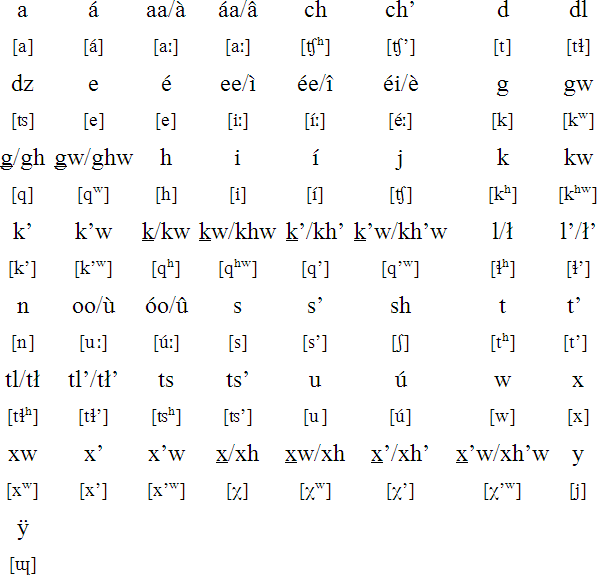Tlingit is a Na-Dené language distantly related to Eyak and the Athabaskan languages, with around 400 native speakers in the USA and Canada. It is spoken in Southeast Alaska from Yakutat (Yaakwdáat, Yàkwdât) south to the Canadian border at Portland Canal, and in Canada inland from British Columbia into south central Yukon Territory between Tagish and Kaska northward.
Although the name is spelled “Tlingit” in English it is actually pronounced [ˈklɪŋ.kɪt], i.e. “Klinkit”. This is due to the spelling and the pronunciation in English having two different approximations of the voiceless lateral fricative [ɬ] spelled as either ł or l in Tlingit.
There are three orthographies currently in use for Tlingit. The oldest of these is the “Revised Popular” orthography which developed in the 1970s from the now abandoned system devised by Constance Naish and Gillian Story in the 1960s. The Revised Popular orthography is used in native languge publications in Alaska, as well as in anthropological and linguistic publications generally. The “Canadian” orthography was devised in the early 1980s at the Yukon Native Language Centre for use by Tlingit people in Canada. The “Email” orthography developed anonymously among people attempting to write Tlingit in email and on the web. It is a compromise which preserves most of the Revised Popular orthography but discards the underscore diacritic for uvular sounds in favor the consonant+h symbols from the Canadian system. In all three systems, all unaspirated sounds occuring at the end of syllables are written with symbols for the aspirated sounds.
The sound ÿ [ɰ] no longer exists in the speech of native speakers today, however it does occur in recordings of people made in the 1960s and 1970s, and was noted by linguists and anthropologists in the 19th and early 20th centuries. This sound has changed into either y [j] or w [w] depending on the roundedness of surrounding sounds in a word. Thus the word yáay / yây [jáːj] ‘whaleʼ used to be ÿáaÿ / ÿâÿ [ɰáːɰ], and the word wóow / wûw [wúːw] ‘chestʼ used to be ÿóow / ÿûw [ɰúːw].
The dialects of Tlingit spoken in Canada have influence from neighboring Athabaskan languages, and as such include words with sounds that do not otherwise occur in Tlingit. Examples include mesdzí [mes.tsí] ‘owlʼ (Bubo virginianus) and dalèyi [ta.leː.ji] ‘lake troutʼ (Salvelinus namaycush). The distinction between [l] versus [ɬ] in some words is why the Canadian orthography uses a barred l “ł” for [ɬ] whereas the others do not.

Download an alphabet chart for Tlingit (Excel)
How to pronounce Tlingit:
Chʼa yéi gugénkʼ áwé a kaax̱ shukalisʼúx̱, haa tlagoo ḵwáanxʼi aadé s ḵunoogu yé. Haa léelkʼw hás aadé yéi s jineiyi yé áwé, de áa awtulxaaji át áwé, áa haa waḵkeeyaḵaa. Ách áwé kakawtuwakélʼ. Dei kawtoo.aag̱óon áwé x̱á, haa tláa léelkʼw hás, haa tláa káak hás, hasdu ḵusteeyí, hasdu yoo x̱ʼatángi. Dei áa awtulixaaji át áwé, haa jiyís. Haa jeexʼ kakeeyakélʼ. Ách áwé tsu héide shugax̱tootáan, yá yaaḵoosgé daakeit, haa jeexʼ anáḵ has kawdikʼéetʼ.
(Kichnáalx̱, 1980)
Chʼa yê gugénkʼ áwé a kàxh shukałisʼúxh, hà tłagù khwânxʼi àdé s khunùgu yé. Hà łîłkʼw hás àdé yê s jinèyi yé áwé, de â awtułxàji át áwé, â hà wakhkìyakhà. Ách áwé kakawtuwakéłʼ. Dè kawtù.àghûn áwé xhá, hà tłà łîłkʼw hás, hà tłâ kâk hás, hasdu khustìyí, hasdu yù xhʼatángi. Dè â awtułixàji át áwé, hà jìyís. Hà jìxʼ kakìyakéłʼ. Ách áwé tsu hêde shugaxhtùtân, yá yàkhùsgé dàkèt, hà jìxʼ anákh has kawdikʼîtʼ.
(Kichnâłxh, 1980)
Chʼa yéi gugénkʼ áwé a kaaxh shukalisʼúxh, haa tlagoo khwáanxʼi aadé s khunoogu yé. Haa léelkʼw hás aadé yéi s jineiyi yé áwé, de áa awtulxaaji át áwé, áa haa wakhkeeyakhaa. Ách áwé kakawtuwakélʼ. Dei kawtoo.aaghóon áwé xhá, haa tláa léelkʼw hás, haa tláa káak hás, hasdu khusteeyí, hasdu yoo xhʼatángi. Dei áa awtulixaaji át áwé, haa jiyís. Haa jeexʼ kakeeyakélʼ. Ách áwé tsu héide shugaxhtootáan, yá yaakhoosgé daakeit, haa jeexʼ anákh has kawdikʼéetʼ.
(Kichnáalxh, 1980)
We have only uncovered a tiny portion of the way our ancient people used to do things. How our grandfathers used to handle things is what we had given up, what you told us to look at. That is why we untied it. We had tried it, you see, our mothersʼ grandfathers, our mothersʼ maternal uncles, their culture, their language. We had given them up for ourselves. You have untied it for us. That is why we will open it again, this container of wisdom left in our hands.
(George Davis, 1980)
Information about Tlingit and sample texts provided by James Crippen
Information about Tlingit | Numbers
Information about the Tlingit language
http://en.wikipedia.org/wiki/Tlingit_language
Tlingit language resources
http://www.alaskool.org/language/indexing/tlingindex.htm
http://www.sealaskaheritage.org/programs/language_resources.htm
http://www.tlingitlanguage.org
Online Tlingit dictionary
http://www.alaskool.org/language/dictionaries/akn/dictionary.asp
Online Tlingit lessons
http://www.khns.org/listen_tlingit_archive.php
Tlingit Culture, Language and Literacy Classrooms at Harborveiw Elementary School, Juneau, Alaska: http://www.jsd.k12.ak.us/hbv/Programs/tlingit_classrooms/
CCTHITA (Central Council of the Tlingit and Haida Indian Tribes of Alaska)
http://www.tlingit-haida.org
Israel Shotridge - Native Tlingit Carver
http://www.shotridgestudios.com/welcome.html
Alaskan Orthodox texts (Aleut, Alutiiq, Tlingit, Yup'ik). An ongoing project
offering Alaskan Orthodox texts on-line in their original languages and alphabets
http://www.asna.ca/alaska/
Ahtna, Apache (Western), Babine-Witsuwit'en, Chilcotin, Chipewyan, Deg Xinag, Denaʼina, Dane-zaa (Beaver), Eyak, Gwich'in, Hän, Hupa, Jicarilla, Kaska, Koyukon, Lipan Apache, Lower Tanana, Mescalero-Chiricahua, Navajo, North Slavey, Sekani, South Slavey, Tahltan, Tanacross, Tłı̨chǫ (Dogrib), Tolowa, Tsuut'ina (Sarcee), Tutchone, Upper Kuskokwim, Upper Tanana
Languages written with the Latin alphabet
Page last modified: 01.06.25
[top]
You can support this site by Buying Me A Coffee, and if you like what you see on this page, you can use the buttons below to share it with people you know.

If you like this site and find it useful, you can support it by making a donation via PayPal or Patreon, or by contributing in other ways. Omniglot is how I make my living.
Note: all links on this site to Amazon.com, Amazon.co.uk
and Amazon.fr
are affiliate links. This means I earn a commission if you click on any of them and buy something. So by clicking on these links you can help to support this site.
[top]